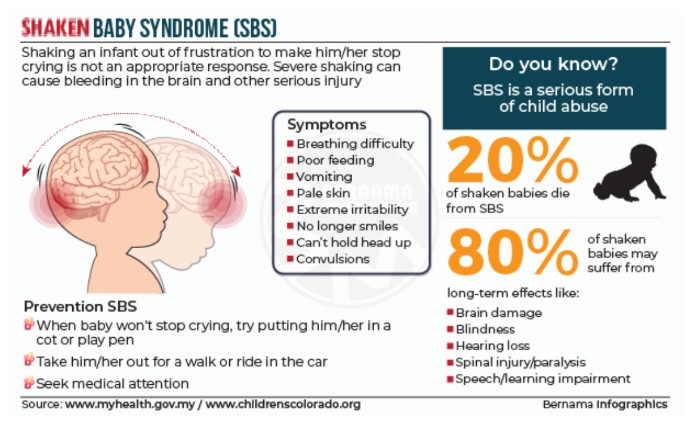Shaken Baby Syndrome (SBS)

What is Shaken Baby Syndrome (SBS)?
Shaken Baby Syndrome is an outcome of child abuse where an infant is violently shaken causing their brain to sustain damage inside their skull. Since a baby's brain is much softer than an adult's and their neck muscles have not fully developed yet, this shaking makes the brain bounce inside the skull and causes bruising, swelling and bleeding which can damage a child's brain cells resulting in irreparable damage such as developmental disabilities, physical impairments, blindness, seizures or even death.
How does Shaken Baby Syndrome happen?
Playful light bouncing on the knee or sitting in a bumpy car ride will not cause the problems seen in Shaken Baby Syndrome (SBS). But when a baby is thrown, dropped or carried and shaken with violent force causing their head to whip back and forth, their brain is sustaining bruising and bleeding that leads to Shaken Baby Syndrome.
This syndrome primarily affects babies who are younger than two years of age, with the majority of cases arising before they turn one. On average, those affected by this disorder range from 3-8 months old. In most cases, this happens when the baby has been crying for a long time and the parents or caretakers think shaking them would make the baby stop. However, parents in stressful environments due to social, financial and biological issues may likely become more abrupt and violent. Domestic violence coupled with substance abuse can put families at an even higher risk of child abuse.


What are the symptoms to look out for?
The signs may appear immediately after the shaking and usually reach a peak within 4-6 hours. The following signs and symptoms may indicate Shaken Baby Syndrome:
- Extreme fussiness or irritability
- Difficulty staying awake
- Dilated pupils that do not respond to light
- Breathing problems
- Decrease in appetite
- Vomiting
- Pale or bluish skin
- Convulsions or seizures
- Paralysis
- Coma
- Death
Shaken baby syndrome is completely preventable. Taking care of a baby can present challenges, especially for first-time parents. New parent education classes can help parents better understand the dangers of violent shaking and may provide tips to soothe a crying baby and manage stress. However, it is important to remember that it is never acceptable to shake, throw or hit a baby. If other people help take care of your child — whether a hired caregiver, sibling or grandparent — make sure they know the dangers of shaken baby syndrome (SBS).

The Period of PURPLE-Crying
This is a phase that all babies go thru in the first 6 months of their life where they cry nonstop for no apparent reason and there is nothing their parents can do to soothe them. Studies have shown that this is a normal part of every infant's development d the word Period is important because it tells parents that it is only temporary and will come to an end. However, this phase is also the trigger for a lot of Shaken Baby Syndrome cases due to frustrated and stressed-out new parents unable to soothe their baby.
PURPLE is an acronym for:
P : Peaks of crying - Your baby may cry more each week, the most in 2 months, then less in months 3-5.
U : Unexpected - Crying can often happen for no apparent reason.
R : Resistant to soothing - Your baby may not stop crying no matter what you try.
P : Pain-like expression - A crying baby may look like they are in pain, even when they are not.
L : Long lasting - Crying can last as much as 5 hours a day or more.
E : Evening crying is common – what many parents know as the “Witching Hour” is now a scientifically proven fact.

How do you prevent SBS?
Shaken baby syndrome is completely preventable. Taking care of a baby can present challenges, especially for first-time parents. New parent education classes can help parents better understand the dangers of violent shaking and may provide tips to soothe a crying baby and manage stress. However, it is important to remember that it is never acceptable to shake, throw or hit a baby. If other people help take care of your child — whether a hired caregiver, sibling or grandparent — make sure they know the dangers of shaken baby syndrome (SBS).
Jan 17,2023
